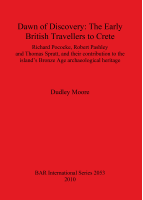Description
BOOK DESCRIPTIONThis work focuses on three important British travellers to Crete during the 18th and 19th centuries to establish whether or not they made any significant contribution to the field of research with regard to the archaeological heritage of Bronze Age Crete. It brings these 'lost pioneers' of antiquity to the fore and to recognize their efforts as part of the foundation of the discovery of the island's Bronze Age archaeology prior to the groundbreaking excavations of Sir Arthur Evans. They are Richard Pococke (1704-65), Robert Pashley (1805-59) and Thomas Spratt (1811-88). Having dealt with the terms that these travellers used in describing ancient remains, the work looks briefly at the background to Bronze Age Crete itself. Thereafter the development from antiquarianism into archaeology is followed to establish the motives behind these travellers' wanderings in Crete. Consideration is given to whether any sites they described might have been of the Bronze Age and, in addition, various views of the mythicalLabyrinth are looked at in an attempt to compound the theory that there may have been a certain belief in a period prior to the known Classical era (of the 5th century BC Greece). Questions answered include: How do the travellers' 'field surveys' and discoveries compare with what is now known today from excavation? Were some of their references to 'Cyclopean' stonework an identification of Bronze Age architecture? Do they deserve recognition for the identification of a prehistory of Crete? Why are their names missing from so many books on the history of archaeology and the discovery of Cretan archaeology? This work brings together, for the first time, an understanding of the views and comparative discoveries of three 18th and 19th century travellers of the, then, unknown ancient pre-history of Bronze Age Crete.











